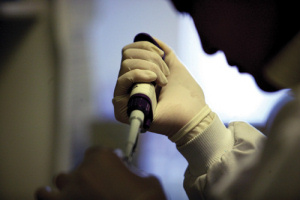Bioscience investment for Manchester
27 Jan 2012
The Minister for Universities and Science, David Willetts has announced £67 million of new investment in postgraduate training and development in the biosciences - including £6.3 million for The University of Manchester.

The investment, from the Biotechnology and Biological Sciences Research Council (BBSRC), includes support for 14 Doctoral Training Partnerships (DTPs) across the UK as well as a number of industrial CASE (iCASE) studentship awards.
Over the next three years, the DTPs will support 660 four-year PhD students; in addition the iCASE studentships will support 70 postgraduates from this Autumn. Manchester will get 21 students a year over the three years.
Both programmes will provide highly skilled scientists for academia, policy and industry and support the BBSRC mission to further scientific knowledge for economic growth, wealth and job creation - improving the quality of life in the UK and beyond.
Minister for Universities and Science David Willetts said: “This £67 million investment in postgraduate training is excellent news for students, research organisations, industry and the UK as a whole. The brightest and best students will be finding solutions to some of the biggest challenges facing us all, from food security through to renewable energy.
“The partnership approach means that many institutions are combining their strengths to provide students with improved training and relevant work experience. This will better equip them for future careers, be it in research, industry, or elsewhere.”
The DTPs represent a new, more strategic approach from BBSRC to deliver highly skilled scientists for the UK research base. Taken as a whole, the DTP programme will deliver scientists with the training to meet major social and economic challenges in food security, sustainable bioenergy and renewable materials and improving lifelong health and wellbeing, as well as supporting those undertaking research in core underpinning bioscience.
An innovative and integral element of the programme, built in to enhance the employability of the DTP students, is the requirement for them to undertake a three-month professional internship outside of the lab to widen their experience of the areas of work in which they can apply their PhD skills and training. Destinations for these internships will include policymaking, media, teaching and industry.
BBSRC will be working closely with each DTP to support the delivery of excellent training and facilitate the development of a cohort of highly skilled BBSRC early career scientists. To provide greater support for the research training costs of each student, and to recognise rising research inflation, BBSRC is awarding significantly higher research training grants for each student of £5,000 per student, per year.
Dr Celia Caulcott, BBSRC Director of Innovation and Skills said: “We believe that this approach is a great way of doing things, enabling us to support the very best students working in the most important areas from food security through to crucial underpinning bioscience.
“DTPs are all about training researchers to be the best they can be. By doing this we can make real inroads into answering global conundrums which will ultimately have a massive impact on the UK economy and further afield.”
The DTP funding allows institutions to recruit the best students and secure additional funding from other sources, such as industry or charities to increase the impact of public investment. The DTPs have been awarded by BBSRC following a competitive process including assessment by BBSRC’s independent Training Awards Committee. Each student in a DTP will have the benefit of working in an excellent research environment but the awarding criteria also focused on the ability of each partnership to provide the best possible training programme.
